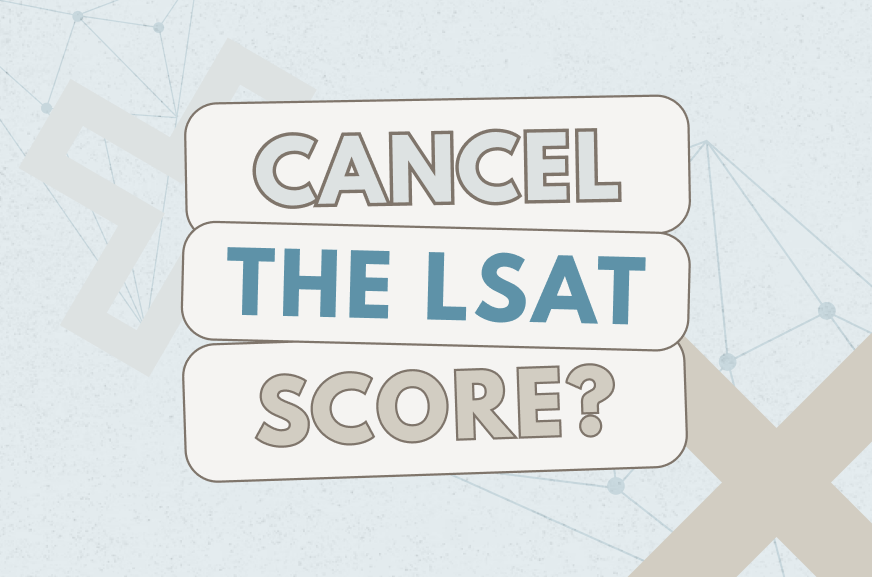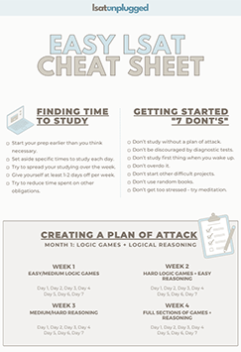Hope the LSAT went well for you!
If the LSAT might not have gone so well, read the below post, but also check out:
LSAT Study Schedules for Retakers (scroll down)
One bad reason to cancel your LSAT score is that the LSAT has become such a large part of your life that you just don’t want to let it go. It’s a slippery slope, my friends.
Seriously now, this post is for those who took the LSAT and are now deciding whether to cancel the score.
First of all, relax. Even if it didn’t go great, this isn’t the end of the world. Everything is going to be fine. Take a deep breath, have a glass of water, listen to these calming waves (mp3), and count backward slowly from 1,000.
Done?
Ok, good.
If you fall within one of the following groups, you should almost certainly NOT cancel your score:
-You just have a vague sense of impending doom (this is a common feeling).
-You just think you didn’t do as well as you normally do, and maybe got a few more questions wrong than usual (also common). There have been plenty of people who thought it went horribly, but didn’t cancel their scores, and and ended up scoring 170+.
-You just feel like this test was a bit harder than the LSAT PrepTests you did for practice (also common). It often seems more difficult when you know it’s for real.
However, if you fall within one of the following groups, you should almost certainly cancel your score:
-You misbubbled several questions.
-You feel you could do a lot better if you gave yourself a few more months to study and/or feel you didn’t really give yourself enough time to study before.
-You were coughing, sniffling, sneezing, nose-blowing, and/or vomiting so much that you didn’t have enough time to adequately complete the number of questions per section that you normally do.
-You were coughing, sniffling, sneezing, nose-blowing, and/or vomiting so much that other test-takers voted you off the island, took away your test booklet, and repeatedly punched you in the face.
-The jerk sitting next to you was sick and prevented you from concentrating.
-You panicked. In your practice tests, you were always able to complete 4 games, 4 passages, and the entire LR section, but on Test Day, you got really nervous, forgot everything you knew, and know you didn’t even come close to your normal performance.
-You couldn’t concentrate because you’ve recently been going through some major life crisis.
-There was an earthquake, terrorist attack, or noisy sporting event / marching band / construction, and it negatively affected your performance, and LSAC isn’t willing to do anything about it. If this happened, before you cancel, call LSAC at 215-968-1001 to inform them of what happened and see whether they’re willing to do anything for you.
-The test-taker next to you morphed into a hyena and bit off your writing hand, so you were unable to diagram in the Logic Games section.
Basically, if something unusual happened that significantly impacted your score in a negative way, canceling may be the way to go.
Some other factors to consider:
Which section was the experimental section?
If you determine which section is the experimental section, this can help you decide whether to cancel.
(FYI, it’s not the same for all test-takers and not all test-takers complete sections in the same order. In other words, there’s more than one ordering in which test-takers complete the scored sections and experimental section.)
Not all test-takers have the same experimental section. Additionally, not all test-takers have the experimental section at the same point in the exam. Some might have it 1st, others might have it 2nd, and others might have it 3rd, 4th, or 5th. For many years, it was always one of the 1st 3 sections, which often made it easy to determine which one it was. However, that changed beginning with the October 2011 LSAT. Since then, test-takers have had the experimental section appearing 4th and 5th also.
If you know there’s one section on which you did especially poorly, figuring out that that one was the experimental would suggest that you might want to lean toward keeping your score. On the other hand, finding out that you did much better on the experimental section than on the real one(s) of that type may suggest that you should lean toward canceling.
Often, the experimental section stands out as being abnormally difficult or abnormally easy. This is due to the fact that the questions in the experimental section are not necessarily intended to compose a full section on a future exam. Rather, they’re simply a bunch of LSAT questions, some of which might appear as part of a future section.
Have you already taken the LSAT and gotten a decent score?
If so, you might want to lean toward canceling, since you wouldn’t want to demonstrate a drop in scores.
If not, you might want to lean toward keeping this one, since you’d otherwise have to retake. You have to hope that next time goes better and that nothing horrible will happen next time. See my post titled “Should You Retake the LSAT?” It brings up some points that may help you decide whether to take another shot at the LSAT.
Have you already taken the LSAT and canceled?
1 cancellation won’t hurt at all, but 2 (or 3 or more) starts to look like you may not have it together. How much does that hurt you? Somewhat.
This sort of thing isn’t really quantifiable due to incomplete data. However, it’s something you want to avoid having too many of, like dead bodies in the basement. Sometimes it just isn’t avoidable, and 1 doesn’t smell too much, but start piling up more than a couple, and the neighbors may start to notice the smell [end creepy/weird analogy]. However, a cancellation is still better than a low score, and you can write an addendum explaining multiple cancellations.
“But I don’t know whether I’d have a low score! You only get to find out what your score would’ve been if you keep it. “
That’s precisely the problem. Incomplete information in decision-making is never fun, especially when the stakes are high. Instead of thinking about how Test Day went as a whole, try to break it down into manageable chunks, section-by-section.
Think about how many questions you were certain of on each section, how many you felt pretty good about, how many you blindly guessed on, and how many you guessed on when you were down to two choices, etc. This will help you calculate various potential scenarios for your score.
For example, in making your estimation, you might give yourself all but a few of the questions you were most certain of on each section, most of the ones you were pretty certain on, 1/5 of the ones you blindly guessed on, and 1/2 of the ones you were down to 2 on, etc.
Then, look at some of the most recent raw score conversions (“curves”) to translate your raw score into a score out of 180. Are you happy with a fairly low-end estimate? What about a medium or a high one?
What scores do you need for your desired law schools?
If you haven’t already, enter your GPA into LSAC’s Official Guide UGPA/LSAT calculator (see upper-left area of that site) to see what kind of score you’d likely need.
See whether one of your reasonable possible score estimations would likely be good enough to get you into a school you’d be happy with. If so, you may want to keep the score.
***
I hope the answers to the above questions end up leading you to keep your score and that you’re done with the LSAT for good. Again, if not, see some LSAT study schedules for retakers (scroll down). Even if you’ve used up every single LSAT PrepTest, there’s still plenty to learn from them, so don’t worry. You’ll still be able to study just fine.
***
I also hope my thoughts in the above post are sufficient to help you make your decision.
Unfortunately, I can’t give everyone personalized advice about whether to cancel, but if you leave a comment, maybe others who read this will give you some thoughts on what to do.
Wish you all the best.

